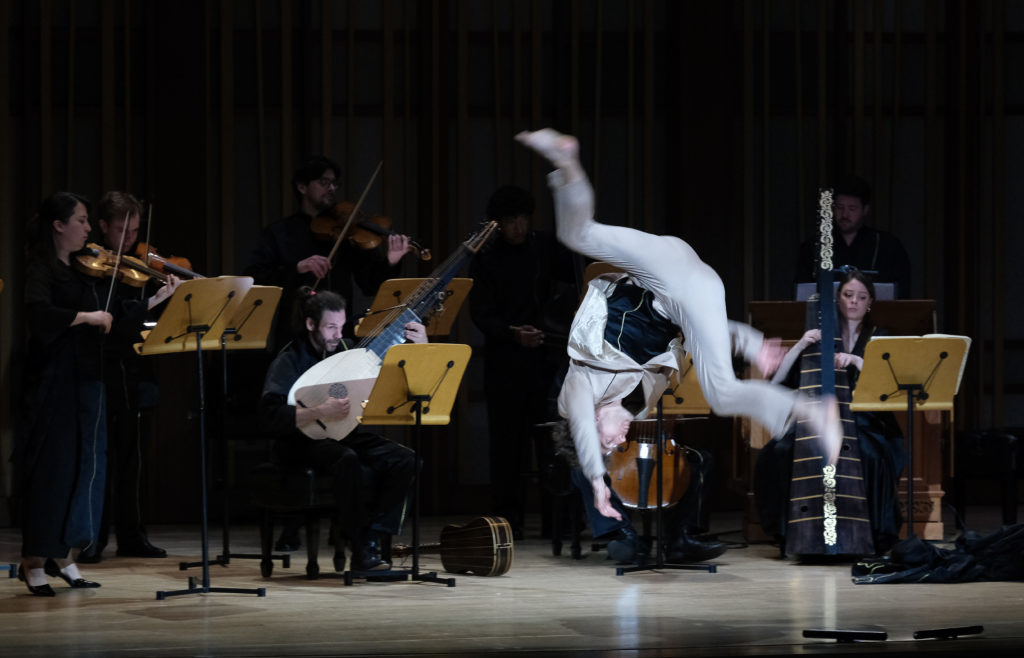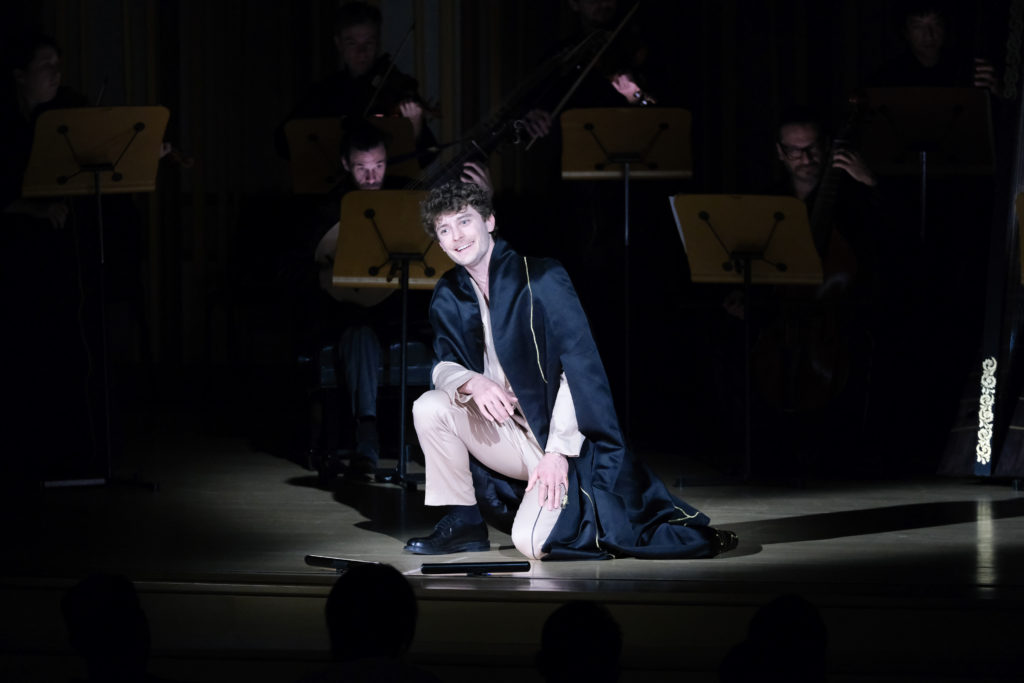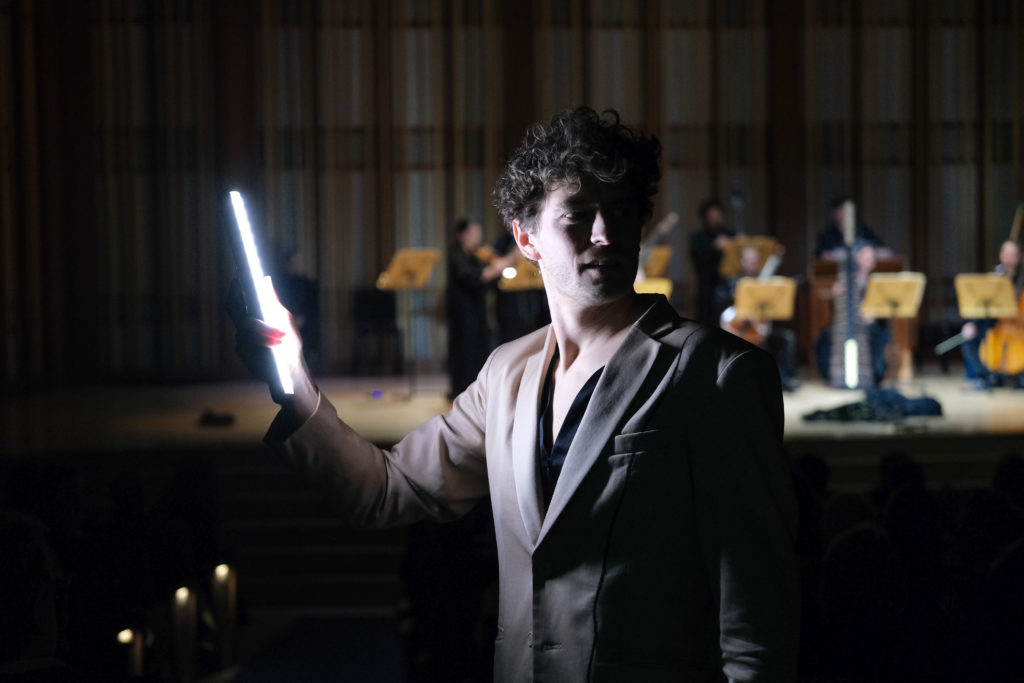Jakub Józef Orliński and Il Pomo d”oro Brilliantly Recreate Early Baroque Vocal Splendor at The Conrad
Among the several aspects of Joyce DiDonato’s stellar concert for the La Jolla Music Society in January of 2023 was her collaboration with Il Pomo d’Oro. Sunday at The Conrad, nine members of this nonpareil early music orchestra returned to accompany the young Polish countertenor Jakub Józef Orliński in an astounding concert of Italian music of the 17th century.
Although the appreciation of Baroque music has grown tremendously in the last 50 — 60 years, the general perception of the Baroque is defined by the greats of the 18th century: J. S. Bach, Handel, Vivaldi, Scarlatti, and Telemann top this heady list of composers whose music is regularly performed in concert halls and churches. But the music of the first 100 years of what we call the Baroque era is hardly known. Occasionally a violinist will play a Biber sonata, or an organist will offer a Frescobaldi canzona, and everyone at least knows that Claudio Monteverdi wrote Orfeo, the first opera, although few opera lovers have actually seen it performed.Orliński and Il Pomo d’Oro gave an astounding performance of this exciting yet rarely encountered music, including several 17th-century composers I had never encountered—and earlier in my career I taught music history to university students! Orliński opened with a dramatic scene from Monteverdi’s last opera The Coronation of Poppea. In “E pur lo torno” the noble Ottone pours out his distress to learn that his beloved Poppea has become Nero’s mistress, and Orliński’s supple countertenor boldly navigated the spurned suitor’s emotional gamut from despair to rage. Orliński’s voice is strong and well-focused throughout the range, displaying just enough color to make it engaging, and it reveals a welcome flash of brilliance in his highest register.
Another scorned lover appears in Girolamo Frescobaldi’s aria “Così me disprezzate?” to air his revenge in vividly accented figures, which the countertenor declaimed with elegant precision. In 2019, San Diego audiences were privileged to experience Opera Neo’s production of Francesco Cavalli’s opera Il Giasone, and from the composer’s later opera Pompeo Magno, Orliński sang the aria “Incomprensibil nume,” written in a gentle parlando style in which Pompey offers thanks to the gods for his many victories.

Why not throw in a cartwheel or two? Orliński in the air, Miguel Rincon on archlute, and Margherita Burattini on harp. [photo (c.) Ken Jacques]
Il Pomo d’Oro offered several winning instrumental works throughout the program, including a stately Passacaglia by Biagio Marini; Carlo Pallavicino’s stirring Sinfonia from his opera Demetrio, and an ebullient Sonata for Two Violins by Johann Kaspar Kerll, a German composer who was Director of Music for Munich’s royal court, although he took his musical studies with the celebrated Giacomo Carissimi in Rome. Violinists Alfia Bakieva and Jonathan Ponet elegantly tossed florid figures back and forth in Kerll’s charming virtuoso sonata. What makes Il Pomo d’Oro’s interpretation of this music exciting–in addition, of course to the admirable technical prowess of its instrumentalists–is the rich variety of instruments the ensemble employs to realize the basso continuo, the Florentine innovation that launched and defined Baroque style. Depending on the style of each selection on the program, keyboard virtuoso Alberto Gaspardo alternated between harpsichord and chamber organ, in the same way that Miguel Rincon alternated between Baroque guitar and archlute, and Margherita Burattini’s Baroque harp added a lilting sheen to the texture. The bass line was shared by cellist Ludovico Minasi and viola da gambist Rodney Prada.
Orliński’s three encores: Giovanni Antonio Boretti’s “Chi scherzo con amor,” Cavalli’s “Lucidissima facce,” and Guiseppe Maria Orlandini’s “Che m’ami ti prega.”
The La Jolla Music Society presented this concert on April 7, 2024, in the Baker-Baum Concert Hall of La Jolla’s Conrad Prebys Performing Arts Center.

Ken Herman, a classically trained pianist and organist, has covered music for the San Diego Union, the Los Angeles Times’ San Diego Edition, and for sandiego.com. He has won numerous awards, including first place for Live Performance and Opera Reviews in the 2017, the 2018, and the 2019 Excellence in Journalism Awards competition held by the San Diego Press Club. A Chicago native, he came to San Diego to pursue a graduate degree and stayed.Read more…



Splendid recital.